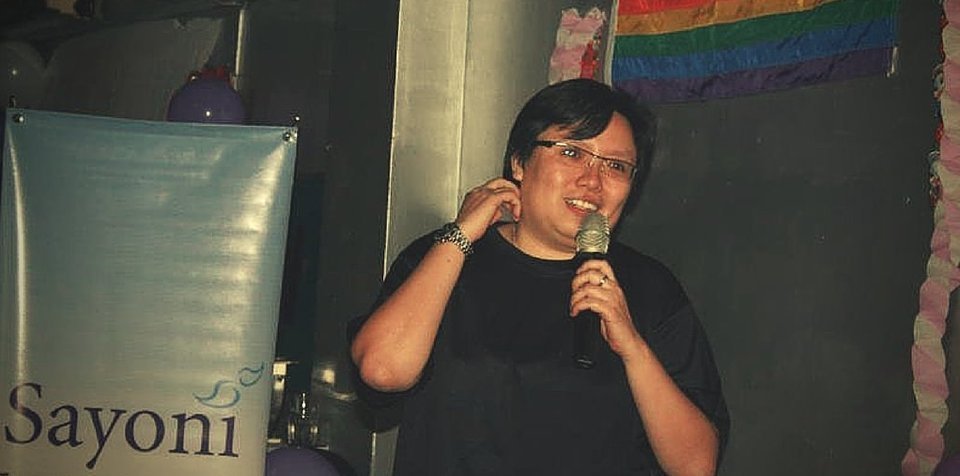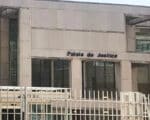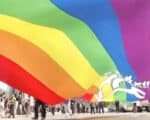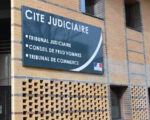>> Being LGBT In Southeast Asia: Stories Of Abuse, Survival And Tremendous Courage
[spacer]
« Personne ne s’intéresse à l’Asie du Sud-Est », affirme la militante LGBT Jean Chong en affichant un sourire forcé, les yeux baissés. « En Occident, ils ont du mal à saisir à quel point nous sommes rétrogrades en matière de droits des LGBT et de droits de l’homme. Ils n’ont pas conscience de la sophistication qu’adopte l’oppression ici. »
Jean Chong milite à Singapour, un des quatre pays de la région où l’homosexualité est illégale. La cité-état, qui fait également partie des quatre tigres asiatiques, est peut-être un des pays les plus riches du monde avec ses gratte-ciels imposants et sa population bien formée, mais ses résultats en matière de droits des LGBT sont effarants. La militante, cofondatrice de Sayoni, une organisation de défense des droits des LGBT, affirme que l’île est devenue un « leader » en matière de restriction – et non de protection – des droits des citoyens.
« Singapour est un cas d’école de ce qui arrive quand le développement économique survient sans droits de l’homme » dit-elle. « Et plus inquiétant, de nombreux pays comme la Chine, le Laos et la Russie veulent aujourd’hui copier le modèle singapourien ».
Sayoni a enquêté sur des cas de maltraitance et de discrimination visant la communauté LGBT ces dernières années. C’est la première fois qu’un tel projet voit le jour dans ce pays, et Jean Chong affirme qu’elle a été « choquée » par ce qu’ils ont découvert.
« Ça nous a vraiment touchés » dit-elle.
Toute de noir vêtue dans la moiteur de cet après-midi de septembre, Jean Chong est d’un abord franc et décontracté. Ses yeux rieurs pointent derrière des lunettes argentées. Elle parle sur un ton neutre, sans animosité, du travail difficile qui est le sien – faire du lobbying auprès des législateurs et essayer de faire évoluer des esprits réticents. A la fin de notre rencontre dans ce café du centre-ville, elle me prend dans ses bras pour une accolade chaleureuse.
Mais quand on lui demande de raconter les histoires de personnes qu’elle a pu rencontrer au cours de ce projet, elle se raidit et sa voix tremble.
« Les cas de maltraitance ne sont souvent pas dénoncés, en particulier lorsqu’ils se produisent au sein de la famille », dit-elle. « Il y a des cas de viols soi-disant ‘correctifs’, ou d’enfants qui deviennent SDF après avoir été rejetés par leur entourage. Une fille m’a raconté qu’elle avait été violée par un ami de son frère, mais que lorsqu’elle l’avait dit à ses propres parents, ils lui avaient répondu qu’elle l’avait ‘mérité’ parce qu’elle était lesbienne. Il y a tout plein d’histoires horribles. La violence est devenue la norme. »
Jean Chong affirme qu’elle est régulièrement victime de discrimination dans l’espace public.
« J’ai l’air d’un garçon manqué, et ici on surveille beaucoup l’apparence en fonction du sexe » explique-t-elle. « Des personnes m’abordent et me disent que je mériterais de me faire tabasser. La non-conformité gêne les gens. »
Ce genre de choses, affirme-t-elle, n’est malheureusement pas propre à Singapour. Le rejet que subit la communauté LGBT est très répandu dans toute l’Asie du Sud-Est (définie, dans le cadre de cet article, comme les 10 Etats membres de l’ASEAN, l’Association des nations d’Asie du Sud-Est). Ces pays diffèrent amplement dans les domaines politique, économique, culturel et historique – du Vietnam communiste au sultanat de Brunei appliquant la charia ou au Myanmar, qui tente de s’ouvrir au monde extérieur après des années d’un régime répressif – mais ils partagent entre eux au moins une caractéristique problématique.
« Lorsqu’on regarde Brunei, Singapour, la Malaisie, le Myanmar, mais aussi le Laos, c’est très rétrograde en matière de droits des LGBT… mais même dans les autres pays, plus ‘progressistes’, il y a des problèmes. Les femmes trop masculines sont tuées dans certaines zones rurales en Thaïlande, les femmes transsexuelles sont prises pour cible aux Philippines », explique Jean Chong.
A l’heure actuelle, l’homosexualité est encore un crime à Brunei, qui applique strictement la charia, et des pays comme Singapour, la Malaisie et le Myanmar persistent à suivre une loi archaïque remontant à l’époque coloniale, qui interdit les relations sexuelles entre personnes de même sexe. Lorsqu’elles sont appliquées, les peines visant les homosexuels dans ces pays peuvent être sévères, et peuvent aller jusqu’à la lapidation, aux coups de fouet ou à l’emprisonnement.
En dehors de la Thaïlande, qui a annoncé ce mois-ci la promulgation d’une loi avant-gardiste pour l’égalité entre les sexes, les pays de l’ASEAN ne disposent actuellement d’aucune législation anti-discrimination qui garantisse l’égalité des citoyens indépendamment de leur orientation ou de leur identité sexuelle. Et la Thaïlande n’a pour l’heure pas de loi protégeant les citoyens du fait de leur orientation sexuelle. Le nouveau texte ne protège que contre les discriminations fondées sur l’apparence sexuelle.
Le mariage gay est illégal dans tous les pays de l’ASEAN, et aucun d’entre eux n’a adopté de reconnaissance légale ou de protection pour les couples de même sexe, même pas d’union civile. Les couples homosexuels de la région n’ont pas le droit d’adopter d’enfant. Et dans de nombreux pays il est difficile voire impossible à des femmes seules d’avoir accès à une fécondation in vitro et à des traitements ou services liés à la fertilité.
Dans le même ordre d’idée, l’accès à des services comme la chirurgie de ré-attribution sexuelle ou la thérapie hormonale pour les transgenres est limité. Changer d’assignation sexuelle est très difficile dans la plupart des pays de l’ASEAN.
Conséquence de ces cadres législatifs et politiques répressifs, les mauvais traitements et la marginalisation dont sont victimes les LGBT sont omniprésents dans la région.
Un soldat américain est actuellement poursuivi pour le meurtre d’une transsexuelle aux Philippines. Il a avoué l’avoir tuée en l’ »étouffant » dans un motel, après s’être rendu compte qu’elle avait des organes génitaux masculins. Le leader de l’opposition politique malaisienne Anwar Ibrahim purge une peine de cinq années de prison après avoir été reconnu coupable de sodomie, un acte illégal dans ce pays. Et en août dernier, un député du Myanmar a affirmé que le gouvernement « prenait en permanence des mesures » pour que « les gays » soit arrêtés par la police.
« Dans la vie des LGBT [de l’ASEAN], la discrimination est un fil rouge », affirme au Huffington Post Edmund Settle, Policy Advisor du Programme des Nations Unies pour le Développement, dont le bureau est situé à Bangkok.
Edmund Settle fait partie des coordinateurs d’un projet d’envergure récemment lancé par le PNUD et l’Agence américaine pour le développement international (USAID), qui a examiné la situation des droits des LGBT dans différentes parties de l’Asie. Certains pays du sud-est asiatique comme le Vietnam, la Thaïlande et les Philippines ont été inclus dans le périmètre de l’étude.
Et les résultats sont inquiétants.
Ils montrent que dans tous les pays étudiés, les stigmates sociaux et la discrimination restreignent les chances en matière d’emploi et d’éducation, et limitent l’accès aux soins pour les LGBT. Ou encore que les agressions et d’autres formes de maltraitance et de harcèlement sont très fréquentes.
« Les pays [de l’ASEAN] contraignent aussi fortement l’espace de la société civile. Ce manque d’espace pour l’engagement citoyen limite la possibilité d’organiser, de mobiliser et de militer », affirme Settle. « Tout ceci freine les efforts pour améliorer la situation en matière de droits ».
Les activistes de la région font valoir que leurs premières priorités sont de faire pression pour une meilleure visibilité de la communauté LGBT et pour l’adoption de législations nationales anti-discrimination par tous les Etats.
De telles lois sont essentielles ici, affirme Jean Chong, « car jusqu’à présent, dans les pays de l’ASEAN, la promotion et la protection des droits de l’homme sont indigentes ».
Jean Chong fait partie des dirigeants de l’ASEAN Sexual Orientation, Gender Identity and Gender Expression Caucus (Conseil pour l’orientation, l’identité et l’expression sexuelles de l’ASEAN), un collectif militant qui exhorte les dirigeants de la région à intégrer leur réseau aux Mécanismes de l’ASEAN sur les droits de l’homme, y compris à la Déclaration des droits de l’homme de l’organisation régionale. Ce conseil rassemble des associations militantes de tous les pays de l’ASEAN, sauf Brunei et le Laos.
Les groupes LGBT de la région mettent les bouchées doubles pour arriver à faire adopter ces protections juridiques, d’après Ging Cristobal, militante de la Commission internationale pour les droits de l’homme des gays et lesbiennes basée à Manille, elle aussi membre du Caucus. Nous en avons désespérément besoin, dit-elle.
« Je souligne systématiquement que tant que nous ne protègerons pas les LGBT, certains d’entre nous mourront, d’autres s’orienteront vers l’industrie du sexe parce qu’ils n’ont pas de compétences ni la possibilité d’accéder à de meilleurs emplois, et d’autres encore rentreront dans l’illégalité pour pouvoir survivre », affirme Cristobal.
Les défis que doivent relever les militants sont immenses. L’autoritarisme, la corruption et l’instabilité politique sont des marques de fabrique de toute la région, sans même parler d’un mépris bien ancré pour les droits de l’homme.
Il n’en reste pas moins que, comme dans toutes les luttes pour l’égalité qu’a connues l’histoire du monde, ces activistes sont décidés à faire changer les choses.
« Les militants travaillent avec acharnement dans l’ASEAN », dit au Huffington Post Kyle Knight, chercheur spécialiste des droits des LGBT chez Human Rights Watch. « Ils s’attaquent à ces obstacles immenses, qu’ils soient explicites comme les lois de l’époque coloniale ou implicites dans le cas des discriminations. Ce sont des gens incroyablement courageux. »
Cet article, publié à l’origine sur le Huffington Post américain, a été traduit de l’anglais par Mathieu Bouquet.
[spacer]
>> This is a 10-part series on LGBT rights in Southeast Asia, which uncovers the challenges facing the LGBT community in the region and highlights the courageous work of activists there. For the next nine days, we’ll be telling the stories of each country in the region. There will be a new one each day. Scroll to read them.
***
SINGAPORE — “No one cares about Southeast Asia,” LGBT activist Jean Chong says, her eyes downcast as she lets out a small mirthless laugh.
“The western world — they find it hard to comprehend how backward we are when it comes to LGBT and human rights. They don’t understand the sophistication of oppression here.”
Chong is based in Singapore, one of four Southeast Asian nations where it is illegal to be gay. One of the four Asian Tigers, Singapore — with its towering skyscrapers and affluent, well-educated population — may be one of the richest countries in the world, but when it comes to LGBT rights, it has an appalling record. Chong says it’s become a “leader” in limiting, rather than protecting, the rights of its people.
“Singapore is a case study of what happens when you have economic success without human rights,” Chong, who is a co-founder of the LGBT rights organization Sayoni, says. “And what’s disturbing is how a lot of countries, like China and Laos and Russia, now want to copy Singapore’s model.”
Sayoni has been documenting cases of abuse and discrimination against Singapore’s LGBT community over the last few years. It’s the first time that such a project has been undertaken here, and Chong says she’s been “shocked” by what they’ve uncovered.
“It’s been quite emotional,” she says.
Dressed in black on a sticky September afternoon, Chong has an easy, open demeanor. Her eyes smile behind her silver-rimmed spectacles. She speaks evenly, and without anger, about the challenging work she does — lobbying lawmakers and trying to change unwilling hearts. At the end of our meeting at a downtown cafe, she envelops me in a warm embrace.
Yet, when asked to share stories from the people she met during the project, her shoulders stiffen and her voice quavers.
“There’s so much abuse that’s being underreported, especially within the family,” she says. “There are cases of so-called ‘corrective’ rape, or kids becoming homeless after being kicked out. One girl told me she was raped by her brother’s friend but when she told her parents, they said she had ‘deserved it’ because she was a lesbian. There have been all kinds of horror stories. Violence has just become so normalized.”
Chong says she regularly faces discrimination in public.
“I look tomboyish and there’s a lot of gender-policing,” she says. “I have people who will just walk up to me and tell me I should get beaten up. Non-conformity disturbs people.”
Stories like these, Chong says, are unfortunately not unique to Singapore. The rejection of the LGBT community is endemic across Southeast Asia (defined for the purposes of this article as the 10 member states of the Association of Southeast Asian Nations, or ASEAN). The countries may be vastly different in their politics, economy, culture and history — from communist Vietnam to Sharia-ruled Brunei to Myanmar, which is struggling to open itself to the world after years of oppressive rule — but they all share at least one problematic trait.
“If you look at Brunei, Singapore, Malaysia, Myanmar, and also Laos, it’s very backward when it comes to LGBT rights … but even in the other, more ‘progressive’ countries, there are problems. Butch women are being killed in rural areas in Thailand, trans women are being targeted in the Philippines,” Chong says.
At the time of writing, homosexuality remains criminalized in Brunei, which abides by strict Sharia law, and countries like Singapore, Malaysia and Myanmar continue to adhere to an antiquated colonial-era law that bans same-sex intercourse. When enforced, the punishment for being gay in these countries can be severe, including: being stoned to death, whipped, or thrown in prison.
Other than Thailand, which just this month announced the enactment of a groundbreaking Gender Equality Law, ASEAN countries currently don’t have anti-discrimination laws to guarantee equality of all citizens, regardless of their sexual orientation and gender identity. Thailand still does not have legislation protecting persons based on sexual orientation. The new law only protects against discrimination on the grounds of gender expression.
Gay marriage is illegal in all the ASEAN countries, and none of them has offered legal recognition or protection for same-sex partnerships, including civil unions. Same-sex couples across the region aren’t entitled to adopt children. And in many countries, it is difficult, if not impossible, for single women to access in vitro fertilization and related fertility treatments and services.
Similarly, access to services such as gender-confirmation surgery or hormone therapy for transgender people is limited. Changing one’s gender designation is also a challenge in most of ASEAN.
As a result of these repressive legal and policy frameworks, the abuse and marginalization of LGBT persons is a pervasive problem across the region.
A U.S. Marine is currently on trial for the murder of a trans woman in the Philippines. He has admitted to “choking” her to death in a motel after discovering that she had male genitalia. Malaysian opposition leader Anwar Ibrahim is serving a five-year prison term after he was convicted of sodomy, which is illegal in the country. And last August, a member of parliament in Myanmar said the government was “constantly taking action” to have “the gays” detained by police.
“Discrimination is a common thread, going through LGBTI lives throughout [ASEAN],” Edmund Settle, a policy advisor for the United Nations Development Programme, tells The Huffington Post from his office in Bangkok.
Settle is one of the coordinators of a recent landmark project spearheaded by the UNDP and the U.S. Agency for International Development, which analyzed the state of LGBT rights in parts of Asia. Several Southeast Asian countries, including Vietnam, Thailand and the Philippines, were included in the study.
The findings were alarming.
Social stigma and discrimination were found to be limiting job and education opportunities, as well as access to healthcare for LGBT people in all the ASEAN countries studied. Bullying and other forms of abuse and harassment were also found to be widespread.
“[ASEAN] countries are also really limiting civil society space. This lack of space for civic engagement limits the ability to organize, mobilize and advocate,” Settle says. “This is hampering efforts to improve the state of rights.”
Activists in the region say their main priorities are pushing for greater visibility for the LGBT community, and also for the enactment of national anti-discrimination legislation in all countries.
Such legislation is critical in the region, Chong says, “because so far ASEAN nations have very poor promotion and protection of human rights.”
Chong is one of the leaders of the ASEAN Sexual Orientation, Gender Identity and Gender Expression Caucus, an activist collective that’s urging regional leaders to include the network in ASEAN Human Rights Mechanisms, including the association’s Human Rights Declaration. Except for Brunei and Laos, the caucus includes activist groups from all the ASEAN countries.
Every day we don’t protect LGBT people, some of us die, some of us turn to sex work because we don’t have the skills or access to better employment, some of us turn to illegal work to live.
Regional LGBT groups are working double-time in an effort to push for these legal protections, according to Ging Cristobal, a Manila-based activist with OutRight Action International and another leader of the Caucus. The need is desperate, she says.
“I always emphasize that every day we don’t protect LGBT people, some of us die, some of us turn to sex work because we don’t have the skills or access to better employment, some of us turn to illegal work to live,” Cristobal says.
The challenges facing the activist community, however, are immense. Across the region, there are major issues of authoritarianism, corruption and political instability, not to mention an entrenched disregard for human rights.
Still, as with fights of equality through history and the world over, regional activists are determined to make a difference.
“Activists are working assiduously across ASEAN,” Kyle Knight, an LGBT rights researcher at Human Rights Watch, tells HuffPost. “They’re going up against these great obstacles, either explicit ones in the case of colonial-era laws or implicit in the form of discrimination. These are incredibly courageous people.”
*****
Aceh, located on the northern tip of the island of Sumatra, is known for its draconian system of Sharia law. It has a population of 4.7 million and is the only province in Indonesia where homosexuality is illegal. According to a December Reuters report, the LGBT community has been forced “into hiding” there.
Earlier this year, the deputy mayor of Banda Aceh, the province’s capital, labeled homosexuality “a social disease that should be eradicated.”
The province, however, is hardly the only place in Indonesia where it’s unsafe to be LGBT.
Last October, a transgender woman named Jennifer Laude was found dead inside a motel room in Olongapo City, Philippines. Motel staff found her naked body on the floor of the bathroom, her head leaning on the rim of the toilet bowl.
U.S. Marine Joseph Scott Pemberton admitted in August to strangling the woman. The 19-year-old said in court that he was “repulsed” and “feared he would be raped” after discovering that Laude was transgender. That fear, he said, prompted him to “subdue” her in self-defense.
He later allegedly told a fellow Marine: “I think I killed a he/she.”
LGBT activist Corky Hope Maranan told the Associated Press last year that the case was one of the worst hate crimes she has seen.“This is just so abominable,” she said.
Kenneth Chee and Gary Lim have been together for almost two decades, but in the eyes of the law they’re criminals.
The couple met by chance at a shopping mall in Singapore in 1997. “I guess my ‘gaydar’ went off,” Chee recalls. “I just went up to him and asked him for his number.” They’ve been inseparable ever since.
“If gay marriage was legal here, we would get married in a heartbeat,” Lim says. Chee, by his side, nods in agreement.
But gay marriage is not legal in Singapore. Same-sex civil partnerships are also not recognized, and there are no laws that protect against discrimination on the grounds of gender expression or sexual orientation.
When Meas Sophanuth started to transition in high school, his mother — afraid that her child would bring shame to the family — tried to stop what she saw as his “unnatural” behavior.
She took away his phone, kept him at home, and forbade him from seeing his friends. She finally took her son to a traditional healer, known in Cambodia as a Kru Khmer, in the hope that the shaman would be able to “cure” him.
It was a traumatic experience, Sophanuth, who identifies as transgender, told the Phnom Penh Post last year. “After that, I did not feel warm to my parents anymore. They frightened me,” he said.
Such attempts at “curing” are not uncommon in Cambodia, where LGBT people are often seen as being mentally ill or as being possessed with “bad spirits.”
In Brunei, being gay could soon be punishable by death.
But that hasn’t always been the case. Homosexuality has long been a criminal offense in the country, which is located on the island of Borneo. But while the punishment was previously 10 years in prison, the oil-rich sultanate announced last year that it was introducing a three-phased plan to impose Islamic Sharia law at the national level — becoming the first Southeast Asian country to do so. Under the new law, same-sex intercourse is punishable by death by stoning.
“It’s a return to medieval punishment,” Phil Robertson, deputy Asia director for Human Rights Watch told The Guardian last year. “It’s a huge step back for human rights in [the country] and totally out of step with the 21st century.”
CONTINUE READING.
Walk into any theater in Malaysia screening a movie with a gay, lesbian, bisexual or transgender character, and you can expect to watch a similar plot unfold: All LGBT characters will « die or repent” by the end of the film.
In a move that was considered to be an improvement, the Malaysian government’s Film Censorship Board issued a controversial guideline change in 2010.
“We are now allowed to show these scenes,” Malaysian Film Producers’ Association president Ahmad Puad Onah told Agence France-Presse. “As long as we portray good triumphing over evil and there is a lesson learned in the film, such as from a gay [character] who turns into a [straight] man. Previously we are not allowed to show these at all.”
Malaysia has long been unequivocal in its stance on LGBT issues.
When a group of transgender women was arrested by police officers in the city of Mandalay, Myanmar, in 2013, they were allegedly forced to strip in public, before being taken to a nearby police station where they were “repeatedly punched and kicked.”
A police spokesman said at the time that the cops had been performing a “public service” by preventing the group from congregating.
Hla Myat Tun, a human rights activist with the Burmese LGBT group Colors Rainbow, tells The Huffington Post that such “state-sponsored discrimination” is a grave concern for the LGBT community in Myanmar, where homosexuality is criminalized.
“Vietnam: Flawed on Human Rights, but a Leader in Gay Rights” read a 2013 Atlantic headline. “On Gay Rights, Vietnam is Now More Progressive Than America,” NBC News reported in January. A few days earlier, Bloomberg had declared: “Gay Weddings Planned as Vietnam Marriage Law Is Repealed.”
But the positive headlines only tell part of the story. Activists say while Vietnam is certainly evolving when it comes to LGBT issues, it’s not a “leader in gay rights.” LGBT people face widespread abuse and discrimination, particularly in their homes. And though the country — one of two communist nations in Southeast Asia — abolished a ban on same-sex marriage earlier this year, gay couples are neither recognized nor protected by law.
If there is one word to describe the LGBT community in Laos, the landlocked nation sandwiched between Thailand and Vietnam, it might just be “invisible.”
“‘LGBT’ is still abstract terminology, yet to be clearly identified to the eyes and ears of the public,” Anan Bouapha, who is often referred to as the leader of the country’s nascent LGBT movement, tells The Huffington Post.
Still, there has been limited progress in recognizing the LGBT community.
At Wat Kreung Tai Wittaya, a Buddhist temple in Chiang Khong, Thailand, transgender teens are being taught to be “more manly.”
“We cannot change all of them but what we can do is to control their behavior to make them understand that they were born as a man … and cannot act like a woman,” Headmaster Phra Pitsanu Witcharato told Agence France Presse in 2011.
About 2.5 percent of LGBT teens in Thailand, a Buddhist-majority country, are forced to enter the monkhood to be “cured,” according to the Foundation for Sexual Orientation and Gender Identity Rights and Justice. Some are pushed into undergoing psychological treatment by their families, while others are kicked out of the home.
Cet article, publié à l’origine sur le Huffington Post américain, a été traduit de l’anglais par Mathieu Bouquet.

















